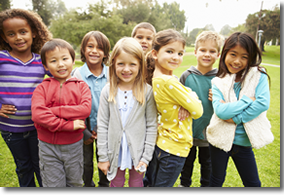Please Keep Your Hands to Yourself
Have you ever noticed a baby's cheeks getting caressed by a stranger, or feet tickled while waiting in line? Have people expressed how cute the child is, and reached out to touch the little one's hands? Has it happened under your watch? Are you the one who did it? Do you continually do it, innocently—with good intentions, while out and about?
caressed by a stranger, or feet tickled while waiting in line? Have people expressed how cute the child is, and reached out to touch the little one's hands? Has it happened under your watch? Are you the one who did it? Do you continually do it, innocently—with good intentions, while out and about?
As a mom, I constantly struggled with this when my child was very young. Stores, for me, were a constant battle ground, where it seemed that many people wanted to reach out and show their appreciation of how adorable my little one was by attempting to shower physical touch. It almost seemed as if people just couldn't help themselves.
Once, I was holding my baby in one arm while loading a grocery store's belt with the other. I turned around to find that a stranger was pulling on my child's hand behind my line of sight—with the same fingersI had observed the woman literally picking her teeth with just minutes earlier. By the way, as my brain registered the horror of what was happening, my child promptly took that hand and put it right in the mouth before I could intercept it with a sanitizing wipe. While walking a different day with the little one in my arms, a stranger who had been walking in the opposite direction quickly darted in front of me and grabbed both of my little one's cheeks—giving them a hearty squeeze before exclaiming, "cute!" and continuing on her way. I'm not exaggerating when I say that dozens of individuals have reached out their arms to see if my child would come to them in public. Countless have tried to peer into the stroller to get a closer look while also cooing—and sometimes, even coughing. I have experienced two different occasions where the stranger became offended and chastised ME when I asked them not to touch my little one when their hands zoomed in to touch my child's face. Even when on high alert, these scenarios happened frequently!
Flu season is upon us, and children are extremely vulnerable to getting sick. We can't avoid every store altogether, especially when we need the essentials. But, there are some practical things that each of us can do to protect the health of not just the little ones in our care, but also the elderly and immune—compromised individuals. Whether you have littles of your own, or are simply an innocent bystander in a store, perhaps these tips might help as you navigate this flu season:
Please review these tips to keep babies safe and healthy:
- Keep your hands to yourself: I plead with each of you, please, do not touch others' infants or babies in public, especially during flu season—or really, anytime! Also, avoid touching babies' hands, as they typically go right into the mouth.
- Wash those hands: No matter how "clean" you think your hands are, always freshly wash your hands thoroughly before holding an infant or young baby—or even coming near one. Hands, carts, produce, product packaging, toys and stores are full of germs and bacteria that could be harmful for babies' immature immune systems. Don't get me wrong, some bacteria is good for those systems—but flu season is not a time to experiment.
- Keep away when sick: If you are sick, or have been around others who are sick, do not go to a social function where you know infants (or people with immune compromised systems) will be. Stay away from the crowds, stores and especially little children.
- When visitors come: If you're the parent, have a pump of sanitizer ready for anyone who comes over, send everyone directly to the bathroom to wash their hands and have a no-sick person policy. It's OK to say "no" to someone who wants to come over if they're under the weather. And, if that person is primarily concerned about your child's welfare, they'll agree.
- No touch signs: Consider purchasing or gifting "no touch" signs like these.
- CDC recommends to vaccinate: The CDC recommends that everyone 6 months or older vaccinate for the flu every year. Since 2014, there have been at least 500 U.S. pediatric deaths directly related to the flu. Younger children (younger than 6 months) have the greatest risk of contracting the flu. Reports have shown that half of the children who die from the flu every year don't have known risk factors for flu complications.
- Consider a delivery grocery service: If you're sick, have a newborn or your little isn't ready to face the crowds or the stores, consider a grocery service that either delivers foods directly from your local store, or, allows you to pick up from the store parking lot without having to leave your car.
- Check out these additional tips on protecting little ones.
This article is not part of your continuing training. To access your required bulletins you must log in using the form in the upper left-hand corner of the screen. Then go to the TRAINING tab.



